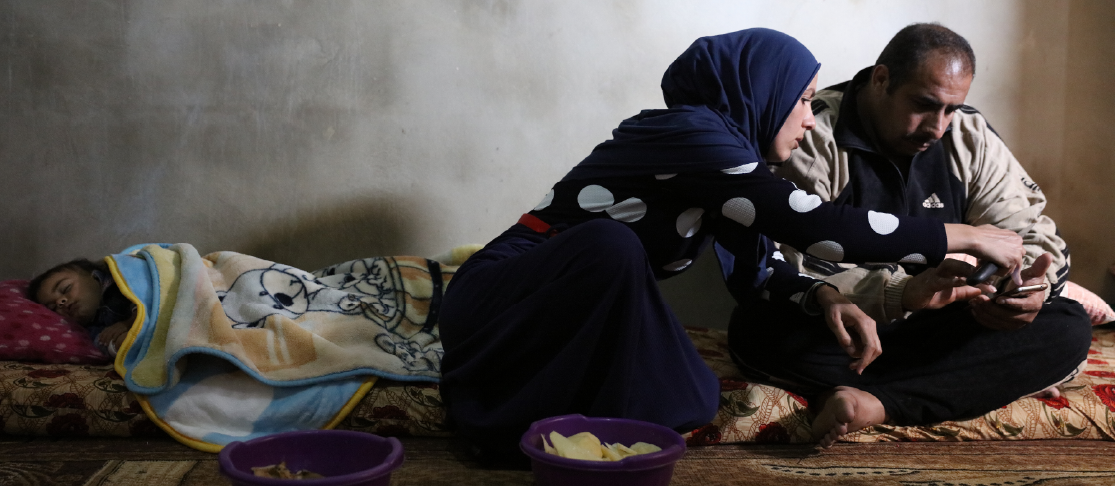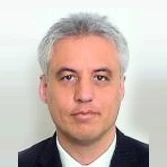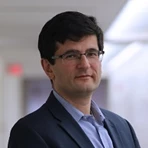 A Syrian family in their living room in Tripoli, Lebanon, where they had lived as refugees for the last 4 years. Photo © Dominic Chavez/World Bank
A Syrian family in their living room in Tripoli, Lebanon, where they had lived as refugees for the last 4 years. Photo © Dominic Chavez/World Bank
“The priestly leaders of the Parsis were brought before the local ruler, Jadhav Rana, who presented them with a vessel full of milk to signify that the surrounding lands could not possibly accommodate any more people. The Parsi head priest responded by slipping some sugar into the milk to signify how the strangers would enrich the local community without displacing them. They would dissolve into life like sugar dissolves in the milk, sweetening the society but not unsettling it. The ruler responded to the eloquent image and granted the exiles land and permission to practice their religion unhindered if they would respect local customs, and learn the local language, Gujarati.”
This old Parsi legend vividly illustrates the challenges and opportunities faced by migrants and their host communities, and it is as relevant today as it was centuries ago. From Ukraine to Afghanistan, from Venezuela to Ethiopia, media headlines provide a daily reminder of the centrality of the issue in our current lives.
This is not an abstract conversation about economic and social problems. It is about Anna from Kharkiv, Samir from Cairo, Eugenie from Lome, Geert from Amsterdam, Paola from San Salvador, and Ranjit from Mumbai. It is about people across the world who are looking for better economic opportunities and improved safety: simply put, better lives for themselves and for their families.
Today, around 300 million people live outside their country of birth. Many of the global forces that shape human mobility patterns – conflict, poverty, inequality, among others – are gaining strength , leading to an increasingly polarizing debate. In destination countries, the costs and benefits of receiving migrants and refugees are being questioned. In origin countries, brain drain, broken families, and alienation of their citizens in faraway lands are causing widespread concern.
There is no doubt that human mobility has benefited humankind, as an intrinsic part of the development process and an effective way to adjust to imbalances and shocks. It has proven to be critical for poverty reduction in a diverse set of communities, and a force for economic prosperity in many destination countries.
But in recent years, the sudden and large inflows of refugees, the constant arrival of undocumented migrants, or the tragic circumstances under which some people travel are fueling unease, calling into question the effectiveness of government policies in both origin and destination countries.
It is time for a rethink if we are to address these concerns and continue to reap the benefits of cross-border mobility. This is the question that the World Development Report (WDR) 2023: Migrants, Refugees, and Societies will explore . We have just published the concept note, with the full report to be completed in the spring of 2023.
From a development perspective, the challenge is to manage economic migration and forced displacement in a manner that maximizes the economic, social, and safety gains—for migrants, for refugees, for their communities of origin and destination. This is critical to achieving the Sustainable Development Goals, in particular SDG#1 to end poverty in all its forms everywhere, building on the consensus achieved through the Global Compact for Safe, Orderly and Regular Migration and the Global Compact on Refugees.
The basic tenet of this WDR is that there is a need to shift from traditional approaches that underpin mobility—based on labor markets for economic migrants and on legal protection for refugees—to a more holistic perspective. The WDR aims to articulate a development perspective and identify policy options to deliver a system of ‘better mobility’ in a transforming world, while recognizing that each situation is unique. There is no “one-size-fits-all” model or set of policies that apply across the globe.
The WDR sees migrants and refugees first and foremost as persons, endowed with agency, individual identity, and dignity. Similarly, countries of origin and destination are more than labor markets or sanctuaries: they are complex societies with a sense of shared belonging and processes to form collective choices and decisions. To manage cross-border mobility, one needs to look at the economic implications of movements, at their social impacts, and at considerations of human dignity . The interplay between these three dimensions is where many of the complexities, tensions, and policy challenges lie.
The WDR will use this framework to explore three sets of issues, using analytical tools, case studies, and human stories.

- What makes people move to another country? The WDR will review the global, regional, and national forces—shocks, stresses, and imbalances—that influence mobility, and will discuss what may change in the coming decades, including demographic forces, climate change, and overall development patterns.
- How can relevant actors maximize the positive impacts and mitigate the negative effects? The WDR will focus on the policies that countries of origin and destination, as well as other stakeholders can adopt for a system of safe, orderly, and regular migration that benefits all.
- What is the necessary scope for collective action? The WDR will discuss the nexus between international protection and development, and how the international community can best support those who are forced to move.
Over the last few months, the WDR team has been engaging with a range of stakeholders to hear diverse perspectives in countries of origin and countries of destination, including governments, international organizations, think tanks, academia, and civil society . As we continue with the preparation of this report, we welcome your comments and suggestions, especially regarding specific experiences that can help inform policies.
Contact us at wdr2023_comments@worldbank.org.




Join the Conversation